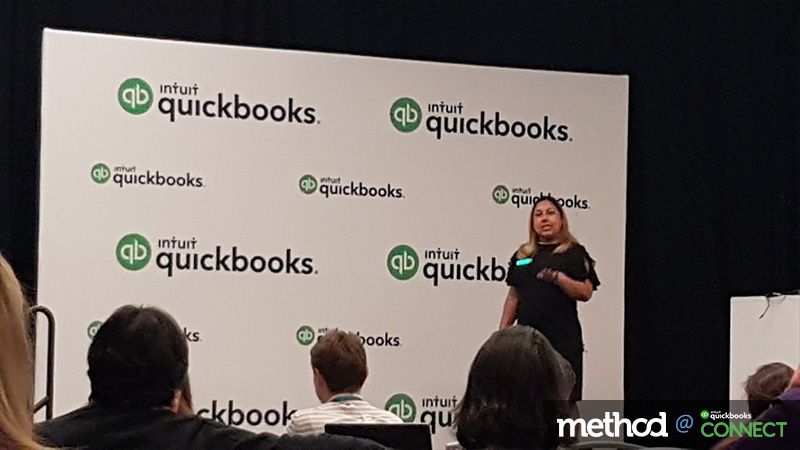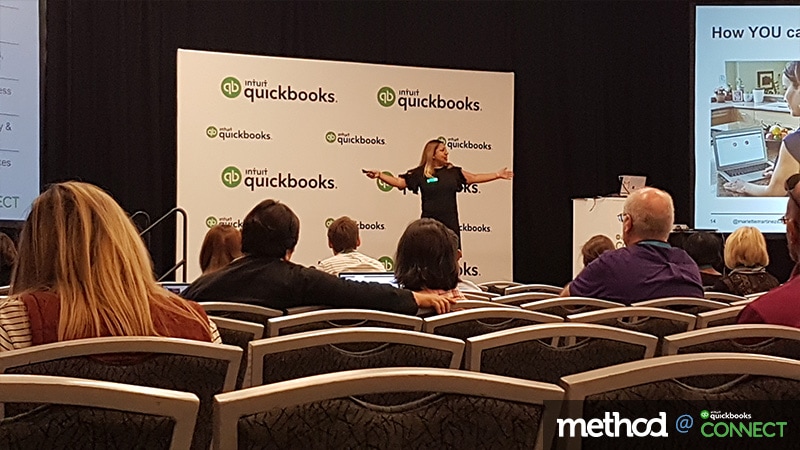Aspiring small business owners face many challenges as they strive to turn their entrepreneurial dreams into profitable reality. One of the biggest hurdles they face is a lack of financial literacy. Many people simply aren’t aware of the unique demands of managing your finances when you’re self-employed.
“They’re making money, but they’re not managing money — and we are in the managing money business,” says Mariette Martinez, speaking to accounting professionals at QuickBooks Connect. As an accountant, tax pro and small business strategist, Martinez is visibly passionate about helping self-employed individuals achieve their business goals through better financial management.
She also immediately dispels the stereotype that the self-employed market can’t or won’t pay for accounting services: “If they see the value that you’re bringing, they will pay for it. The self-employed have been my solo market for the last five years.”
Understanding the gig economy
Other accounting professionals would be wise to follow Martinez’s lead. Nearly 40% of the U.S. workforce now participates in the gig economy, which includes freelancers, independent contractors, contingent workers, and even on-demand workers like Uber and Lyft drivers. And that percentage is only expected to grow, making this the perfect time for accountants to learn how to serve this market.
When assessing a self-employed client’s needs, Martinez advises her colleagues to keep an open mind and avoid jumping in with cookie-cutter solutions. While some entrepreneurs may be content to keep their side hustle on the side, others may be looking to grow and scale. These individual goals need to be taken into consideration.
“The purpose of truly listening to and connecting with the self-employed is not to respond back with perfect answers — but to give you, their trusted advisor, the opportunity to explore and discover the best possible solutions together.”

Assessing the needs of the self-employed
Of course, those who are self-employed tend to share some common pain points. These include cash flow issues, tax struggles, mixing business and personal finances, messy or non-existent mileage tracking, and the dreaded “shoebox dilemma” — a disorganized collection of records and receipts that may or may not live in an actual shoebox.
Beyond these obvious struggles, there are plenty of other details to pay attention to during that initial conversation. Everything from the client’s sales process and customer payment methods to their financial reporting and tax compliance will be relevant to how you proceed as their financial advisor.
QuickBooks Self-Employed: a simple solution
Once you truly understand your client’s struggles and goals, Martinez recommends presenting simple, scalable solutions that will deliver value and save them time. She points out that for the self-employed, “their time is literally their money — so when you start talking about saving, they love that.”
Delivering the right solutions for each client requires a deep understanding of the available options. In other words: just because an individual is self-employed, it doesn’t mean you should default to QuickBooks Self-Employed. Instead, Martinez implores her fellow accounting professionals to do their research about the different versions of QuickBooks: “We need to make our colleagues accountable for becoming technically aware of what’s out there.”
That being said, QuickBooks Self-Employed is a great option for many self-employed clients. Martinez highlights three features in particular that make life easier for those working in the gig economy:
- Real-time, automated bank and credit card feeds.
- Easy categorization of business and personal expenses. Martinez is a stickler for this point when it comes to working with the self-employed: “You want to be kind about it, but you also want to be firm about it.”
- The ability to prepare for tax time early.
Better yet, accountants can collaborate with their QuickBooks Self-Employed clients through QuickBooks Online Accountant. This makes it easier to hold clients accountable to their financial plan.
Delivering the right solutions to the right clients
Just as the gig economy is incredibly diverse, so too are the service offerings that accountants can provide. Martinez suggests three simple and scalable business models.
In the “Soft Touch” model, you provide quarterly bookkeeping as well as tax prep services. This model helps accountants empower their self-employed clients to take control of their own finances.
In the “Trusted Advisor” model, you meet with clients monthly and provide year-round bookkeeping and tax prep services. In this scenario, your clients are constantly held accountable and can get ahead of the game.
In the “One-to-Many” model, you position yourself as an expert on the self-employed market by providing a high volume of one service or digital product. “This is my absolute favorite model,” says Martinez. She offers plenty of ideas for reaching your target audience, including webinars, workshops, templates, blogs, podcasts, and videos.
Building lasting partnerships
Many self-employed individuals avoid working with financial advisors because they don’t think the advisors will be on their side. Martinez wants to dispel that notion: “I want to be your accountability partner. I want you to look forward to having a meeting with me at the end of the year.”
She encourages other accountants to identify which subsets of the gig economy they are most passionate about. For instance, as a mother herself, Martinez loves working with stay-at-home moms and other women.
But no matter which groups you focus on, the key is to get excited about what your clients do. In doing so, accounting professionals will be well-positioned to not only help their clients’ businesses flourish, but to find satisfaction in their own work as well.
Want more #QBConnect content? Check out our full coverage of QuickBooks Connect San Jose 2018!






